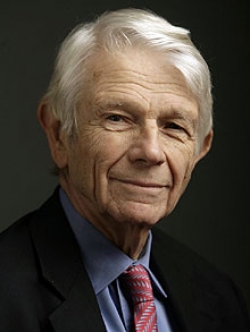 Alex Kalache, HelpAge ambassador, remembers his friend, mentor and ally, Bob Butler (pictured).
Alex Kalache, HelpAge ambassador, remembers his friend, mentor and ally, Bob Butler (pictured).
Bob championed older people’s rights, coined the term ‘ageism’ and worked tirelessly to change negative stereotypes of ageing until just three days before his death on 4 July this year:
Bob’s multiple achievements are well known – from the Pulitzer Prize in 1976 for his seminal book “Why Survive: Being Old in America”, through to his establishment of the US National Institute of Aging and his co-founding of the American Federation for Aging Research, the Alliance for Aging Research, the Alzheimer Disease Association and the American Association for Geriatric Psychiatry.
Add to these ground-breaking initiatives, chairmanship of the White House Conference on Aging by invitation of President Clinton and the creation and directorship of the International Longevity Centre.
Clarity, passion and eloquence
I first met Bob in 1983 at a workshop on medical education that he hosted in New York and was co-organised by the World Health Organization. Bob was then the Chair of the first Professorship in Geriatric Medicine in the United States. At the time, I was still working at the University of Oxford, trying to bring age care into the medical curriculum.
Bob seemed to have all the arguments – based on his teaching experience – and he delivered them with clarity, passion and eloquence. He became an instant role model. Many years later I would tease him: “I have known you longer than you have known me!” He was indeed formidable – but never unapproachable, even for a much more junior colleague.
“I found a strong ally in Bob”
That first encounter took place soon after the First World Assembly on Ageing in Vienna. I was then struggling to call attention to ageing in developing countries, against the received wisdom of the time that ageing was only relevent to the developed world.
I found a strong ally in Bob. He was instrumental in ensuring that at the XIII Congress of the International Association of Gerontology in New York, 1985, there would be a full parallel programme on ageing in developing countries , which I co-organised as a consultant for the WHO Programme on Health of the Elderly to which he was already a senior advisor.
Bob was a compelling communicator. At any international event, the sessions in which he spoke were always “standing room only”. He was equally attentive and welcoming to much smaller groups however, and always had time for one-to-one interactions.
He was often challenging and was never shy to provoke or to ask incisive questions. He was quick to spot any weakness in any argument which he always delivered in a constructive manner that fed one’s own thinking. Above all, he was always caring and supportive.
Ageism is the last major societal taboo
Bob was the only person that I will probably ever meet who created and donated a word to the English language. “Ageism” wasn’t just a word. It was the recognition and labelling of a moral crime. Ageism – he said in 1968 – is the “last major societal taboo” – and “ageing is the neglected step-child of the human life-cycle”.
A shared passion against ageing discrimination consolidated our friendship over the years. Bob was an inspiration behind the WHO “Missing Voices” study which I launched in 2000, in my position of directing the WHO Programme on Ageing and Health.
Conducted simultaneously in nine countries, the study was an attempt to unearth and to make heard the voices and the suffering of millions of older persons subject to various forms of abuse throughout the world. Bob supported and encouraged the study – and subsequently would often quote from its findings.
A champion and pioneer lost
This shared passion channelled eventually into our campaign toward the adoption by the United Nation of a Convention on the Rights of Older Persons. Bob was always quick to point out that the only group of the population still missing a convention is not only the one increasing the fastest but also the one with very obvious and very specific types of discrimination – from lack of access to education, health and social services to abandonment and negligence, from denial of job opportunities to all forms of elder abuse.
I have lost a friend, a mentor and an ally. The gerontological community has lost a champion and a pioneer. The world has lost a visionary, a man of deeds and a fine humanist. It would honour his memory to commit ourselves with even greater resolve to his last unfulfilled dream – to have adopted the UN Convention on the Rights of Older Persons. Eventually we will succeed. And on that day, the toast will rightly go to our lost leader
